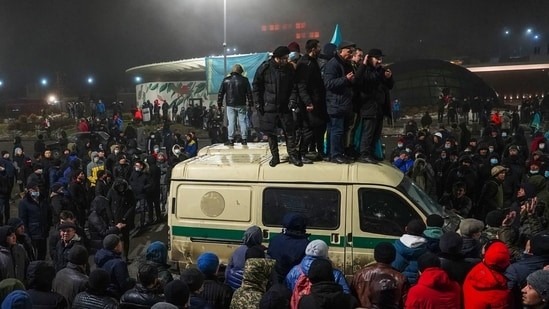| Translate This News In |
|---|
Thousands of demonstrators came to the streets across Kazakhstan to protest a sudden increase in the price of liquefied petroleum gas (LPG), which is used by the majority of Kazakhs for car fuel.
The price increase occurred when the country completed a phased transition to electronic LPG trading in order to phase out government fuel subsidies and let the market to set pricing.
Despite the government’s announcement on Tuesday that fuel prices will be cut to levels even lower than before the hike, and President Kassym-Jomart Tokayev’s dismissal of his cabinet on Wednesday, the protests have continued.
What exactly is the problem?
The reform of the fuel market, which was first proposed in 2015, took effect at the beginning of this month. It aimed to lift governmental price controls on butane and propane, dubbed “road fuels for the poor” because of their low cost, while also ensuring that the local market was adequately supplied.
Kazakhstan, a large oil producer, had previously experienced recurring butane and propane shortages as a result of previous subsidies.
The administration expected that once prices were fully liberalised on January 1 (Saturday), supplies to the domestic market would increase, helping to alleviate severe shortages.
The measure, however, backfired, with prices virtually doubling overnight to 120 tenge per litre.
What was the origin of the uprising?
Over the weekend, the public outrage began to boil over in western Kazakhstan, which is wealthy in oil. It had taken control of the entire country by Tuesday.
The public was already enraged by growing inflation, which was approaching 9% year-on-year for the first time in over five years, prompting the central bank to boost interest rates to 9.75 percent.
A million individuals are projected to be living in poverty in this resource-rich country of 19 million people.
Kazakhstan’s oil production has been unaffected by the protests thus far.
In the protests, eight cops were slain.
According to the Russian news source Sputnik, eight police officers and national guard soldiers were murdered in the rioting on Tuesday and Wednesday.
According to the news agency Reuters, demonstrators have taken control of Almaty’s airport, causing flights to be cancelled.
In a televised speech, President Tokayev said that foreign-trained “terrorist” groups were capturing buildings, infrastructure, and weaponry, and that they had taken five planes, including international planes, from Almaty airport.
Armenia’s prime minister said on Thursday that an ex-Soviet security alliance led by Russia will send peacekeeping personnel to Kazakhstan.
The perspective of Nazarbayev
Initially triggered by a spike in petrol prices, the protests swiftly grew to include wider opposition to President Tokayev’s predecessor, Nursultan Nazarbayev, who remained in power as “Leader of the Nation” despite stepping down in 2019 after nearly three decades in office.
Nazarbayev, who is 81 years old, is largely regarded as the most powerful political figure in Nur-Sultan, the country’s capital. His family is thought to control a huge portion of Central Asia’s economy. Since the protests began, he hasn’t been seen or heard from.
The government’s retaliation to the demonstrations
Kazakhstan’s government declared a state of emergency and dispatched military units to combat “terrorists,” as Tokayev put it.
Tokayev can impose a curfew, ban protests, and restrict internet access under the state of emergency, which he declared to quash Kazakhstan’s rare displays of dissent.
According to NetBlocks, a London-based monitoring outfit, there was an internet blackout across the country by Wednesday following a day of mobile internet problems and partial limitations.
a larger picture
The measure is the Kremlin’s second significant intervention in as many years to bolster up an ally in trouble. In 2020, President Vladimir Putin intervened to support Belarusian President Alexander Lukashenko’s suppression on public protests, which prompted US and allied sanctions.
The Kremlin has consistently criticised mass rallies in former Soviet states, describing them as attempts by the West to overturn governments through “colour revolutions.”
On Facebook, Alexander Baunov, a senior fellow at the Carnegie Moscow Center, said that Russia is facing “strategic instability on all borders and it can’t afford to get sidetracked.” “At the same time as Russia was expanding on Ukraine, protests erupted across Kazakhstan, which may need to be saved.”
Kazakhstan is a “valuable partner,” according to State Department spokesman Ned Price, who added that the US was closely monitoring the situation.


















